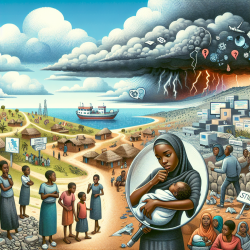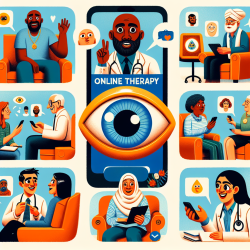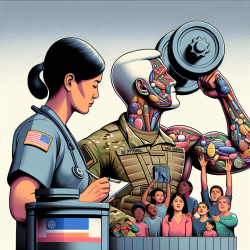Understanding Adolescent Childbearing: Insights and Implications for Practitioners

The phenomenon of adolescent childbearing remains a pressing issue in many parts of the world, particularly in low and middle-income countries like Rwanda. A recent qualitative study titled “My friends said they should no longer be with a b*tch like me…” explores the consequences faced by teen mothers in the Gatsibo district of Rwanda. This study provides valuable insights that can help practitioners improve their support for these young women.
The Study's Findings
The research identified three main themes regarding the consequences of adolescent childbearing:
- Self-Reported Health Outcomes: Teen mothers reported experiencing both physical and psychological problems during pregnancy and after delivery. Physical issues included prolonged labor and anemia, while psychological challenges encompassed stress, anxiety, depression, and even suicidal thoughts.
- Socio-Economic Consequences: The study highlighted significant socio-economic impacts such as lack of social support, stigma, discrimination, domestic violence, school dropout, and financial constraints. These factors contribute to a cycle of poverty and limited opportunities for young mothers.
- Structural Barriers to Healthcare Access: Teen mothers faced challenges accessing healthcare due to adverse facility requirements, stigma from adult mothers, and negative attitudes from healthcare providers.
Implications for Practitioners
The findings from this study underscore the need for targeted interventions to support adolescent mothers. Here are some strategies practitioners can consider:
- Mental Health Support: Providing access to mental health services is crucial. Practitioners should be trained to recognize signs of distress in teen mothers and offer counseling or referrals to appropriate services.
- Social Support Networks: Establishing support groups for teen mothers can help reduce feelings of isolation and provide a platform for sharing experiences and advice.
- Educational Opportunities: Encouraging continued education through flexible schooling options or vocational training can empower young mothers to improve their socio-economic status.
- Sensitization Programs: Educating communities about the challenges faced by teen mothers can help reduce stigma and promote a more supportive environment.
- Healthcare Provider Training: Training healthcare providers to adopt a non-judgmental approach when dealing with teen mothers can improve their healthcare experiences.
The Need for Further Research
This study highlights areas where further research is needed. Understanding the long-term impacts of adolescent childbearing on both mothers and children could inform policy changes. Additionally, exploring effective interventions in different cultural contexts can provide insights into best practices globally.
The complexities surrounding adolescent childbearing require a multi-faceted approach involving healthcare professionals, educators, policymakers, and community leaders. By addressing the identified challenges through targeted interventions and ongoing research, we can better support teen mothers in achieving healthier outcomes for themselves and their children.
My friends said they should no longer be with a b*tch like me…”: A qualitative study to explore the consequences of adolescent childbearing among teen mothers in Gatsibo district, Rwanda
Citation: PLOS Glob Public HealthPLOS Glob Public HealthplosPLOS Global Public Health2767-3375Public Library of ScienceSan Francisco, CA USA PMC11389937PMC11389937113899373925973410.1371/journal.pgph.0003716PGPH-D-23-02505Research ArticleMedicine and Health SciencesWomen's HealthMaternal HealthPregnancyMedicine and Health SciencesWomen's HealthObstetrics and GynecologyPregnancyPeople and PlacesPopulation GroupingsFamiliesMothersPeople and PlacesPopulation GroupingsAge GroupsChildrenAdolescentsPeople and PlacesPopulation GroupingsFamiliesChildrenAdolescentsSocial SciencesSociologyHuman FamiliesMedicine and Health SciencesHealth CareHealth Care ProvidersSocial SciencesSociologyEducationSchoolsMedicine and Health SciencesHealth CareHealth Care FacilitiesMedicine and Health SciencesMental Health and Psychiatry“My friends said they should no longer be with a b*tch like me…”: A qualitative study to explore the consequences of adolescent childbearing among teen mothers in Gatsibo district, RwandaConsequences of adolescent childbearing among teen mothers Living in a rural areashttps://orcid.org/0009-0003-6811-3984TwagirayezuInnocentConceptualizationData curationFormal analysisFunding acquisitionInvestigationMethodologyProject administrationResourcesSoftwareSupervisionValidationVisualizationWriting – original draftWriting – review & editing1*RugemaJoselyneConceptualizationData curationFormal analysisProject administrationWriting – original draftWriting – review & editing1NkurunzizaAimableFormal analysisMethodologySoftwareValidationVisualizationWriting – original draftWriting – review & editing1235NyirazigamaAliceConceptualizationData curationMethodologyWriting – review & editing12BagwenezaVedasteConceptualizationData curationWriting – review & editing1NikuzeBelancilleConceptualizationData curation1https://orcid.org/0000-0002-3508-975XNdayisengaJean PierreSoftwareValidationVisualizationWriting – review & editing1241School of Nursing and Midwifery, University of Rwanda College of Medicine and Health Sciences, Kigali, Rwanda2Arthur Labatt Family School of Nursing, Western University, London, Ontario, Canada3Lawrence Bloomberg Faculty of Nursing, University of Toronto, Toronto, Ontario, Canada4Dalla Lana School of Public Health, University of Toronto, Toronto, Ontario, Canada5School of Nursing, Nipissing University, North Bay, Ontario, CanadaRobinsonJuliaEditorPLOS: Public Library of Science, UNITED STATES OF AMERICAThe authors have declared that no competing interests exist.* E-mail: twagiracent@gmail.com1192024202449e0003716191220232082024© 2024 Twagirayezu et al2024Twagirayezu et alhttps://creativecommons.org/licenses/by/4.0/This is an open access article distributed under the terms of the Creative Commons Attribution License, which permits unrestricted use, distribution, and reproduction in any medium, provided the original author and source are credited.In low and middle income countries (LMICs), the rate of teenage pregnancy continues to be high...










